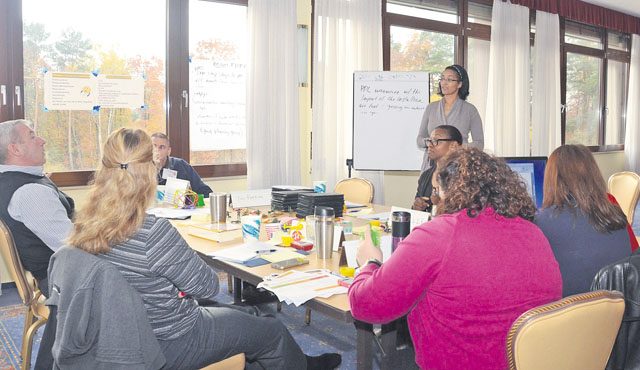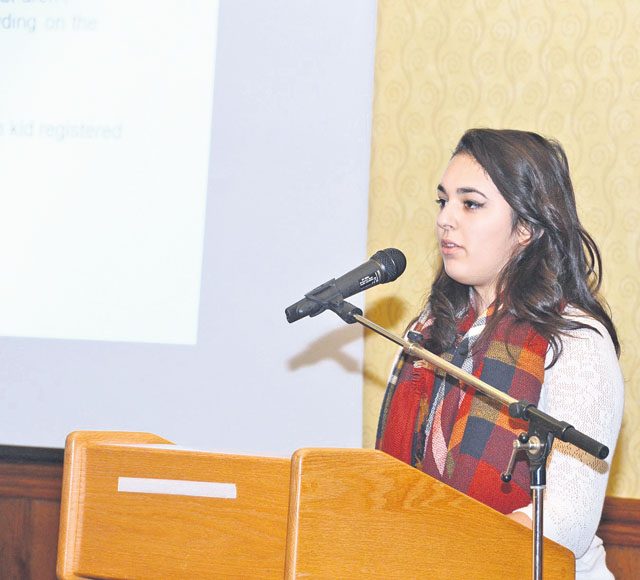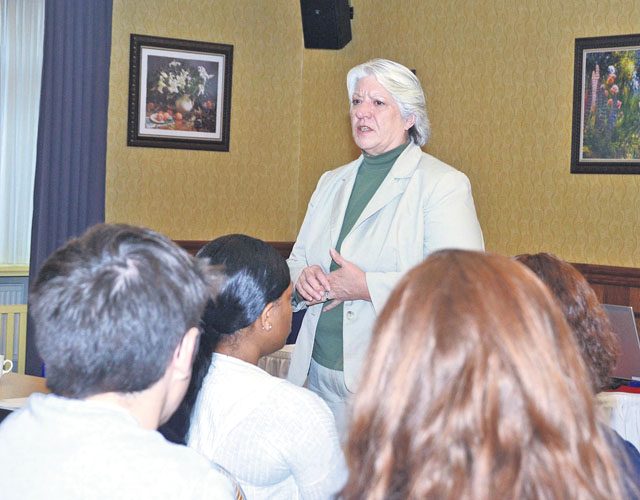
Child care waiting lists and Exceptional Family Member respite care were two of several key topics addressed at the annual Army Family Action Plan town hall Nov. 8 at Armstrong’s Club on Vogelweh.
“AFAP serves as a local grassroots method to identify quality-of-life issues affecting the Army family,” said Laura Batule, Baumholder Army Community Service site lead and U.S. Army Garrison Rheinland-Pfalz AFAP coordinator. “It gives people in the KMC Army community an opportunity to influence the environment where they live and work every day by participating in the program.”
Lengthy overseas child care waiting lists was an issue addressed by AFAP working group members. Lack of child care negatively impacts single- and dual-military parents who struggle to meet mission requirements upon arrival overseas. The working group addressed the issue and recommended a new Department of Defense process allowing parents to pre-register their children on local Child Development Center waiting lists upon receiving military orders. Creating lists of certified and recognized German child care providers and resources available on the local economy were proposed as well.
The child care issue would directly impact AFAP working group member Sgt. 1st Class Ernestine Lewis, sexual assault response coordinator with the U.S. Army NATO Brigade and single parent of two. Lewis said she and other working group members volunteered to make an impact in their community.
“I enjoy being a part of AFAP because you can find solutions to some of the local issues,” Lewis said. “Some military families may think no one cares about them because their concerns are not being addressed. So when you have these types of functions, you can sit down and see what their issues are and help find solutions and come up with recommendations.”
Another issue submitted for discussion was TRICARE support for Exceptional Family Member level 1 and 2 respite care. In overseas military locations, respite care will be eliminated June 30, 2017, for dependents diagnosed with level 1 — mild — and level 2 — moderate — special needs. This issue impacts the resiliency and quality of life for families with special needs loved ones. The working group recommended the Department of the Army reconsider overseas respite care funding for levels 1 and 2. They also suggested possible TRICARE funding for these levels.
AFAP connects leadership with real-life concerns in addition to what they are told in unit formations and Family Readiness Group meetings, Batule said.
“It gives everyone a voice and shows firsthand our Army leadership cares about those who serve in the ranks, retirees, DOD civilian employees and their families who love and support them,” Batule said.
AFAP truly works, said Deborah Reynolds, deputy commander of USAG Rheinland-Pfalz.
“Since 1983, nearly 700 issues have been entered into the AFAP system,” Reynolds explained. “Of the 700, 528 have been resolved and led to the enactment of 129 pieces of legislation, 187 policy changes and 212 improved programs and services. In short, AFAP works because it starts at the grassroots level with our garrison and units, and issues are oftentimes elevated to the highest policy and lawmaking levels.”
Some AFAP concerns came from a younger audience, said Ryan Elegood, a junior at Kaiserslautern High School.
“Our AFAP working group addressed Child and Youth Services career avenues. There is a current program called Junior Staff on Landstuhl offering rudimentary vocational opportunities — working at the gym and kitchen,” Elegood said. “We wanted to expand on that and make it more career-specific, to include health science, robotics, program coding, mechanics or other opportunities that can be translated into future careers. We wanted an improved program that could help high school students with possible internships.”
The more people who get involved with AFAP, the more issues will be addressed and more improvements will be made, Batule said.
“Everyone brings experiences and observations from other installations as well as life through their lens,” Batule concluded. “The more diverse our annual AFAP town hall, the better we can address issues and think outside the box for more efficient, fiscally responsible solutions.”
To submit concerns or check the status of submitted AFAP issues, visit www.MyArmyOneSource.com.




